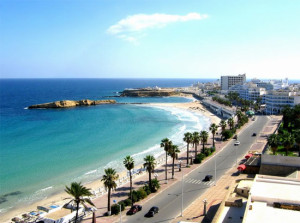 Many American’s think of Tunisia as a dangerous place, but there are signs that perspectives may be shifting. There have been a number of terrorist attacks in the country, including one on the US embassy there in 2012, but the country is undergoing monumental changes to increase political stability and increase security. Will this be enough to encourage a tourism industry? Many Tunisians are banking on it.
Many American’s think of Tunisia as a dangerous place, but there are signs that perspectives may be shifting. There have been a number of terrorist attacks in the country, including one on the US embassy there in 2012, but the country is undergoing monumental changes to increase political stability and increase security. Will this be enough to encourage a tourism industry? Many Tunisians are banking on it.
USA Today reports that tourism is expected to rise sharply in Tunisia, an industry that has been more or less dormant since their revolution during the Arab Spring. With revolution has come social and political freedom, and that is giving citizens hope that they can overcome economic struggles. And they are officially ready to welcome travelers.
Shop owners in the old quarter of Tunis, the country’s capital, are desperate to have tourism return. Before the revolutions, the massive Mediterranean coastline was full of popular beach resorts in close proximity to ancient ruins and beautiful desert landscapes. Dougga, a northern village, is considered by UNESCO to be the closest thing to antiquity-like daily life in Northern Africa, and also a big draw for curious foreigners.
A couple months ago Tunisia received a shout-out from Condê Nast Traveler, calling them the next big travel destination. Reasons cited were the optimism and diversity. While these qualities aren’t usually cited as vacation makers, they are notable in light of other nearby Muslim countries. But don’t worry, there’s also a vibrant nightlife where non-muslims can partake in alcohol and dance until the morning.
The country’s tourism minister, Amel Karboul, has predicted they will receive seven million tourists this year, which would be a record. The hope is that Tunisia’s boast as the first democracy in the Arab world will help to attract travelers hoping to be a part of an historic event. The tourism industry in Tunisia employs over 400k people, and accounts for 7.5% of GDP.
Despite the national feeling of change and progress, Tunisia still has to battle with some harsh realities. Terrorism is still a problem there. Militant attacks continue, and they are constantly facing travel warnings issued by the western world. A suicide attack last year near a beach hotel in a tourist resort town doesn’t make for good press. Future attacks, including kidnappings, are possible, and even expected.
With continued work, though, Tunisia will most likely be grow the number of tourists, which could in itself even play a role in helping to shape the future of the country. Perhaps once the country feels the positive economic impact of tourism, unrest will decline in a more substantial way.